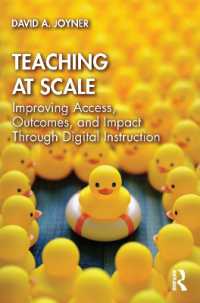Full Description
At a time of significant local, national, and international change, in which children are already actively involved, it seems not only right but necessary that we should be seeking to further our knowledge and understanding of what informs and shapes meaningful and effective practice for and with children. Such research has implications across the spaces that children and adults share whether that is at school, at home, in the law courts, in health care through to local, national, and international platforms for social action.
Establishing Child Centred Practice in a Changing World, Part B extends the conversation to connect research and practices in a changing world. This edition examines children's voices in relation to research methodologies, in particular co-production, as well as extending conversations around child centred practice from forest schools to the home through to community change initiatives that further understandings of what it means to be a learner and an advocate. Authors from around the world offer a range of perspectives to advance transformational practice in a changing world.
Furthering dialogues around the applied relevance of key principles in childhood studies, this diverse edited collection is an important contribution to the fields of education, sociology, childcare and youth policy and practice.
Contents
Chapter 1. Extending the Conversation; Sam Frankel
Chapter 2. Children's Voices in Early Childhood Education and Care; Nadine Correia and Cecília Aguiar
Chapter 3. Children's Voice in Praxiological Transformation; Cristina Mesquita
Chapter 4. Using Pupil Views Templates to Explore Children's Experiences of Teaching and Learning; Kirstin Mulholland
Chapter 5. Engaging Authentic Pupil Voice in Schools; David Littlefair
Chapter 6. Hearing Children's Voices in the Forest; Joanna Hume
Chapter 7. Young Children's Participation in Homeschooling During the Covid-19 Pandemic: A Reflective Case Study from England; Fengling Tang
Chapter 8. Reclaiming Agency: A Social Pedagogical Orientation to Child Centred Practice; Daniel Nester
Chapter 9. Co-production in Creative Design to Amplify Childhood Voices of Parental Separation; Susan Kay-Flowers
Chapter 10. Children's Perceptions of Participation Within their Families: Listening to Children of Bolivian Families Living in Madrid; Rossana Perez-del-Aguila, Patricia Rodriguez Aguirre, and Jimena Cuba Blanco
Chapter 11. Children and Negotiation of Family Rules in Ibadan, Nigeria; Ewajesu Okeewumi and Olayinka Akanale
Chapter 12. Shared Decision-Making Processes in a Contemporary Urban Art Project and its Impact on Children; Joana Campos Louçã
Chapter 13. The 'Added Value' of the Youth Contribution and the Call of Young People for Intergenerational Partnerships: Reflections from the 2021 World Congress for Justice WITH Children; Walt Burkard, Alexandra-Maria Dan, Macholi Chris Benard, Iliana Pujols, and Anas Darouichi
Chapter 14. Youth Political Participation in the Canadian Senate: Discussions with the Vote 16 Steering Group; Gabrielle Gooch
Chapter 15. Childhood Participation in Chile: Debts and Opportunities from Child Protagonism; Paulina Jara-Osorio






